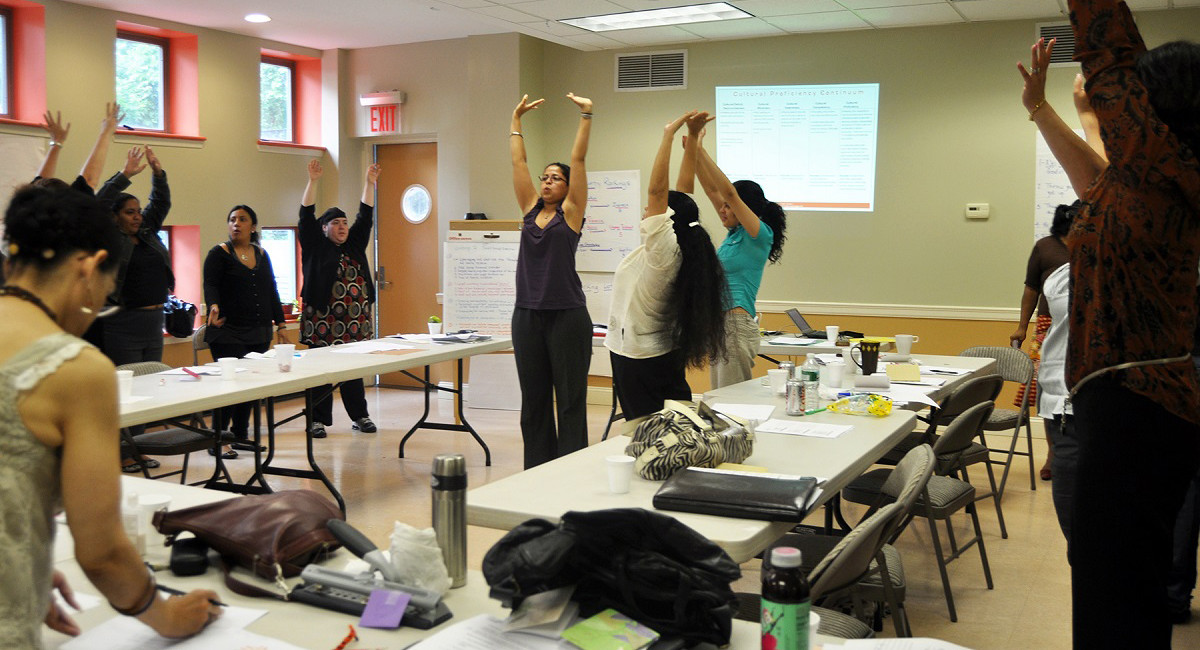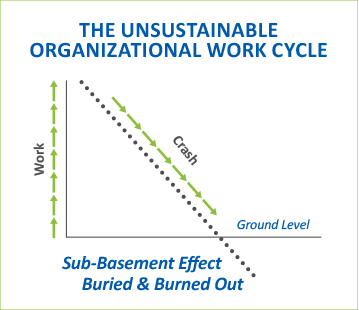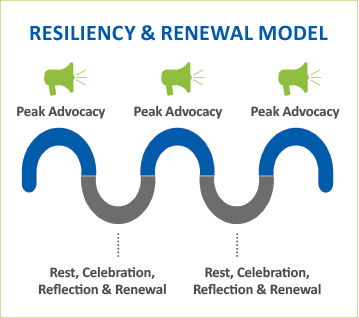
Practicing Self-Care Strengthens Our Movements
Posted In: Self Care | Posted On: January 17, 2016Far too many leaders confuse self-care with selfishness. Our social movements need leaders at the top of their game rather than stressed out, sleep deprived and exhausted leaders. Chronic stress and exhaustion reduce a leader’s attention span, increases emotional volatility and fosters poor decision-making.
Exhausted leaders are a perfect example of the law of diminishing returns. They work harder but have fewer positive results because their ability to reason, think creatively and finish tasks in a timely fashion is impaired. Sleep deprivation is a major culprit. Over 50 studies conclusively show that mental performance — reaction time, memory, analytical reasoning, and executive judgment all decline in proportion to lack of sleep.1
Senior leaders often influence organizational norms and when they model poor self care practices, those behaviors tend to be replicated by staff throughout the organization. So that we find our organizations are staffed with exhausted, chronically stressed individuals on the road to burnout. Where’s the wisdom in that?
For organizations conducting advocacy work and engaged in time sensitive campaigns, the work pace is especially grueling and becomes unsustainable over time.
Unsustainable Work Cycles and the Sub-Basement Effect
 The diagram seen here shows a workflow model where the pace of the work escalates unrelentingly; more and more is demanded of staff and volunteers as the campaign or project unfolds. Staff and volunteers then crash in exhaustion after the campaign or project has finished until the next cycle begins with a new campaign or project.
The diagram seen here shows a workflow model where the pace of the work escalates unrelentingly; more and more is demanded of staff and volunteers as the campaign or project unfolds. Staff and volunteers then crash in exhaustion after the campaign or project has finished until the next cycle begins with a new campaign or project.
For a while the organization seems to be at the vanguard but the pace is not sustainable. Over time energy reserves are depleted, people begin to burn out and it becomes increasingly difficult to reach even a baseline level of people power and energy upon which to build a campaign. In the end, these organizations find themselves on the road to burnout and risk becoming ineffectual.
Renewal & Resiliency Work Habits
Leaders who model a more sustainable work pace have a longer view perspective. They understand that retaining staff means our movement benefits from their expertise and knowledge over the long term. Moreover, they understand that social transformation work begins with oneself.
 As Mahatma Gandhi noted, we must “be the change we seek in the world.”2 The diagram seen here illustrates a more sustainable model for social action that intentionally builds space for renewal, reflection and celebration. This model builds resiliency and keeps our people — our most precious resource — inspired, energized and thinking at their best.
As Mahatma Gandhi noted, we must “be the change we seek in the world.”2 The diagram seen here illustrates a more sustainable model for social action that intentionally builds space for renewal, reflection and celebration. This model builds resiliency and keeps our people — our most precious resource — inspired, energized and thinking at their best.
Building New Habits: Self Care for Sustainability & Impact
Over time we have all developed unproductive habits that interfere with our self-care. Habits are unconscious repetitive acts that are hardwired in our brains. Recent research on the neuroplasticity of the brain indicates that rather than spending energy on trying to undo old behaviors, its best to focus on developing new habits.3
The process of repeating a new behavior creates new neural pathways in our brain and over time the new behavior becomes a habit.4 Researchers estimate that a relatively simple new behavior can take anywhere from 21–66 days to become a habit and that the first days of practicing the new behavior are crucial to reinforcing the new behavior critical to long-term success.5
Moving from Reflection to Action: Six Key Questions
Here are a few reflection questions to get you started on improving your self-care habits:
- How has the quality of your leadership been affected by lack of self-care, chronic stress and exhaustion?
- What is the habit that most adversely impacts your self-care right now?
- Moving forward, what single new behavior can you substitute to practice better self-care?
- What’s your action plan for practicing this new behavior consistently?
- Who will you ask to support you in this endeavor?
- How will you remind yourself and track progress?
— Elsa A. Ríos
Endnotes
1 Robert Gass. “Boundaries for Work: A Contract With Yourself.” The Social Transformation Project, 4 Feb. 2015. Web. 21 Apr. 2015.
2 Carmella B’Hahn, “Be the change you wish to see: An interview with Arun Gandhi,” Reclaiming Children and Youth, vol10, n1 (2001): 6-9. Web. [Paraphrased from VOL 13, Ch 153, General Knowledge About Health, Page 241, Printed in the Indian Opinion on 9/8/1913 from The Collected Works of M. K. Gandhi, published by The Publications Division, New Delhi, India.].
3 David Rock. Quiet Leadership: Six Steps to Transforming Performance at Work. (New York: Harper Collins, 2007). Print.
4 Ibid.
5 James Clear. “How Long Does It Actually Take to Form a New Habit? (Backed by Science).” The Huffington Post, 10

